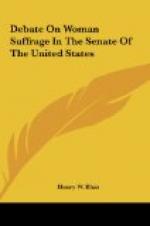of the city of Philadelphia, have condemned in
resolution the action of the governor a year ago,
I think, in vetoing a bill which passed largely
both houses of the Legislature to appoint women inspectors
of prisons. On such questions woman feels
the need of the ballot.
The mothers of this land, having breathed the air of freedom and received the benefits of education, have come to see the necessity of better conditions to fulfill their divinely appointed and universally recognized office. The mothers of this land claim that they have a right to assist in making the laws which control the social relations. We are under the laws inherited from barbarism. They are not the conditions suited to the best exercise of the office of woman, and the women desire the ballot to purge society of the vices that are sure to disintegrate the home, the State, the nation.
I shall not occupy your time further this morning. I only present briefly the mother’s claim, as it is so universally conceded. We now have in our schools a very large majority of women teachers, and it seems to me no one can but recognize the fact that mothers, through their experience in the family, mothers who are at all competent and fit to fulfill their position as mothers in the family, are best fitted to understand the needs and at least should have an equal voice in directing the management of the schools, and also the management of penal and reformatory institutions.
I was in hopes that Mrs. Wallace would give you the testimony she gave us in the convention of the wonderful, amazing good that was accomplished in a reformatory institution where an incorrigible woman was taken from the men’s prison and became not only very tractable, but very helpful in an institution under the influence and management of women. That reformatory institution is managed wholly by women. There is not a man, Mrs. Wallace says, in the building, except the engineer who controls the fire department. Under a management wholly by women, the institution is a very great success. We feel sure that in many ways the influence and power that the mothers bring would tend to convert many conditions that are now tending to destruction through vices, would tend to elevate us morally, purify us, bring us still higher in the standard of humanity, and make us what we ought to be, a holy as well as a happy nation.
REMARKS BY MRS. SARA A. SPENCER, OF WASHINGTON.
Mrs. SPENCER. Miss Susan B. Anthony was chosen to present the constitutional argument in our case before the committee. Unless there is more important business for the individual members of the committee than the protection of one-half of our population, I trust that the limit fixed for our hearing will be extended.
The CHAIRMAN. Miss Anthony is entitled to an hour.
Mrs. SPENCER. Good.
Miss Anthony is from the United States; the
whole United States claim
her.




